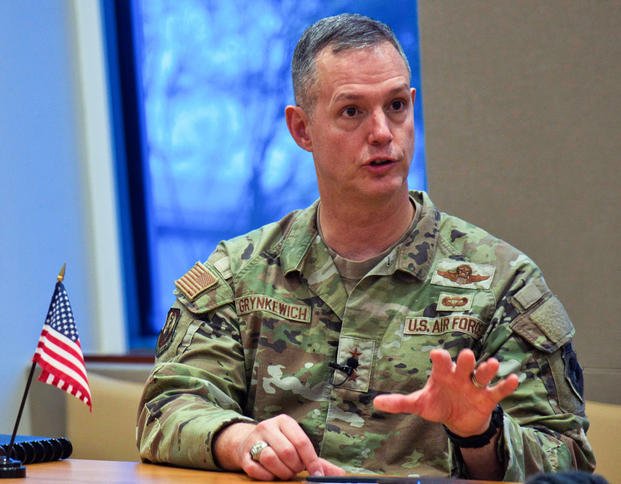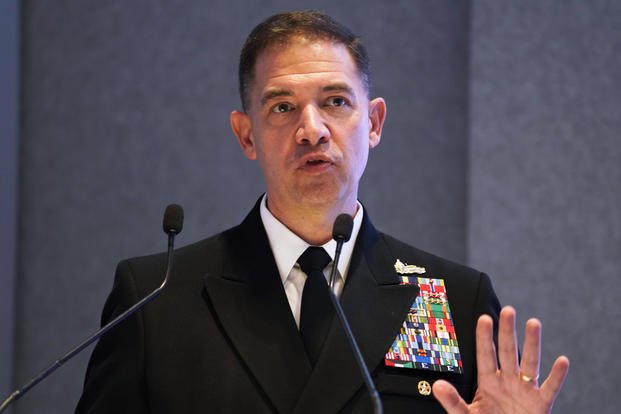'Voluntary in Name Only': Deadline Comes for Transgender Troops to Leave Before Being Kicked Out

The deadline for transgender service members on active duty to voluntarily leave the military arrived Friday, setting the stage for the Pentagon to soon begin kicking out those troops.
For the transgender service members faced with the decision to leave or be booted later, Friday -- which also marks the first full weekend of Pride Month when many cities around the country, including Washington, D.C., will be holding parades and festivals celebrating LGBTQ+ rights -- was an agonizing day.
One of the service members who has decided to leave is Maj. Erica Vandal, a West Point[1] graduate and field artillery officer who was raised in a military family. While Vandal said she "absolutely" wants to continue serving, she had to consider her ability to support her wife and their two children.
Read Next: Army Ends Most Barracks Maintenance at Fort Cavazos Amid Federal Cuts[2]
"Honestly, I feel a lot of guilt regarding my decision," Vandal said in a phone interview Friday. "I have no doubt that is what is best for me and my family, just in our circumstances right now. It is the best decision when weighed against this carrot-and-stick policy that we are currently up against. That being said, I have that kind of guilt that I'm almost taking a step back from this fight contrary to how I was raised by my father and everything that the Army[3] has taught me over the past 14 years."
Friday's deadline for active-duty troops was set in a May memo the Pentagon issued after a Supreme Court ruling allowed the department to enforce a ban on transgender troops while lawsuits against the ban are still under consideration by lower courts.
Transgender members of the reserve and National Guard[4] have until July 7 to voluntarily separate.
The Pentagon had originally set a March deadline for transgender troops to voluntarily leave, but that deadline was forestalled by court rulings before the Supreme Court stepped in.
The department previously said[5] about 1,000 troops requested to voluntarily separate in March, though it has declined to provide a more specific number.
The Pentagon's latest ban on transgender troops is the result of an executive order President Donald Trump signed during his second week in office in January that contended being transgender is "not consistent with the humility and selflessness required of a service member."
Under the policy the Pentagon issued in February to implement Trump's order and reaffirmed in the May memo, troops with a history of gender dysphoria, who "exhibit symptoms" of gender dysphoria, or who have transitioned to their gender identity are now disqualified from service.
Defense officials said in May[6] they will rely on annual health screenings and recommendations from commanders in identifying troops to kick out.
But before that, the department has been trying to entice transgender troops to leave of their own accord by offering financial incentives.
The service members who elected voluntary separation by Friday are eligible for twice the amount of separation pay[7] they would get if they are later involuntarily discharged from the military.
Involuntary separation pay is typically 10% of a service member's annual base pay multiplied by their years of service. Many transgender troops have been serving for a decade or more, so doubled separation pay could easily top $300,000.
The Navy[8] also said this week that it was expanding[9] eligibility for early retirement for transgender troops who voluntarily separate. Under the new criteria, transgender sailors with at least 15 years of service can request early retirement, unlocking significantly more benefits than they would otherwise get for leaving with fewer than 20 years of service.
The Air Force[10] and Army are also allowing transgender troops with at least 15 years of service to request early retirement if they voluntarily separate.
Despite wanting to continue to serve, the separation pay and stability of leaving on her own terms swayed Vandal's decision.
"If I was only worried about myself, there's not a doubt in my mind that I would be fighting this tooth and nail, that this would be the hill I would plant my flag on and would die on if necessary," Vandal said. "However, with the family considerations, I think it drastically changes the kind of math involved with that."
The transgender ban is being challenged by two lawsuits, meaning it could still be blocked by the courts in the coming months.
Vandal is a plaintiff in one of the lawsuits and, despite separating, plans to stay a plaintiff with hopes of one day being reinstated.
"This voluntary separation was a coerced separation, voluntary in name only," she said. "Even after everything, I love this country, I love the Army, I love the military, and I'm proud of my service and would like to continue to serve."
The lawsuits have slowed down considerably since the Supreme Court ruling.
The Ninth Circuit Court of Appeals, which is weighing one of the lawsuit's requests for an injunction against the policy, issued a notice this week saying oral arguments about the injunction could be held in October.
The D.C. Circuit Court of Appeals, which is weighing the other lawsuit's injunction request, has given no indication of when it might issue a decision since it heard oral arguments in April.
Shannon Minter, legal director of the National Center for Lesbian Rights and one of the lawyers for the plaintiffs in the D.C. lawsuit, said the delay since the April arguments is unusually long but speculated the D.C. Circuit is overwhelmed with challenges to Trump administration policies.
Whatever the appeals court decides on the injunction, and even as the ban begins to be implemented, Minter vowed to keep fighting.
"The government itself does not claim -- I mean, they couldn't. There would be nothing to support this -- but they don't claim that any of these service members have done anything wrong. They're simply kicking them out because they're transgender," Minter said. "One hundred percent we're not going to stop fighting."
Related: Pentagon Will Use Health Screenings, Commanders to Ferret Out Trans Troops for Separations[11]
© Copyright 2025 Military.com. All rights reserved. This article may not be republished, rebroadcast, rewritten or otherwise distributed without written permission. To reprint or license this article or any content from Military.com, please submit your request here[12].


